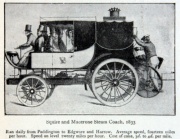
Francis Maceroni and John Squire
1833 October. 'Colonel Maceroni's and Mr. Squire's steam carriage has plied daily, for some weeks, between Paddington and Edgeware, without meeting with the slightest accident or injury to any part of the machinery. Indeed, since it was first started, it has travelled, upon different roads in the neighbourhood of town, a distance of upwards of seventeen hundred miles, yet in the whole of that time it has not been found necessary to go to expense of any kind in repairs to the machinery. The success of the carriage being so complete on roads of ordinary difficulty, Colonel Maceroni determined to take a trip to Harrow on the Hill, which is acknowledged to be one of the most rugged and difficult in the neighbourhood of the metropolis, and which has long been held out by scientific men as the criterion by which to judge of the strength and power of a carriage of this kind; it not being doubted that a machine that could overcome the difficulties of Harrow-bill, would be able easily to meet those of most of the ordinary post roads in the kingdom. In order to give greater efficacy to the trial, the present period was chosen for the experiment, as the hill had been newly laid with gravel, and the difficulty of surmounting it was of course considerably increased by that circumstance. We accompanied the carriage on its trip, and started from Paddington at a quarter to three o'clock, and arrived at Harrow on the Hill (a distance of nine miles) in one hour and forty minutes. But of that period rather more than forty minutes was consumed in taking in water, and trying an experiment with a new drag, so that the whole distance was completed in fifty-eight minutes, exclusive of stoppages. The hill was ascended, apparently with ease, at the rate of seven miles an hour, and during no part of the journey was the full power of the steam put on. It was the opinion of those who best understood the subject, that the journey could have been accomplished in little more than half the time, if the full force of the steam were employed; and it was evident to all that a great accession of speed could have been attained. The journey to Harrow was thus accomplished with success as complete as could be wished by the most sanguine well-wishers of the projectors; but in returning to town, the off-wheels having, in passing some carts, got upon gravel, which had been newly dug up, they sunk suddenly to the depth of two feet, and the carriage, which was then proceeding at the rate of fourteen miles an hour, was suddenly checked, and brought to a stand. It may be considered singular that a machine which had displayed such power during the rest of the journey, should not have been able to extricate itself from this situation, without extraneous aid. But it must be recollected that the whole power of the steam is applied to one of the hind wheels, and that happened to be the wheel which had just sunk to the nave in the gravel. After considerable delay and difficulty, however, the carriage was extricated. So far as the practicability of propelling carriages on common roads, by means of steam is concerned, the question, is set at rest: it only now remains to be ascertained, whether the invention is one which can be put to some practical purpose at such an expense as will afford remuneration to the projectors'[1]
1833 Partnership dissolved. '...the Partnership heretofore subsisting between us the undersigned, John Squire and Francis Maceroni, as Steam Coach-Proprietors, Machinists, and Engineers, carrying on business at No. 19 Wharf, Paddington Green, in the County of Middlesex, was dissolved by mutual consent...'[2]

